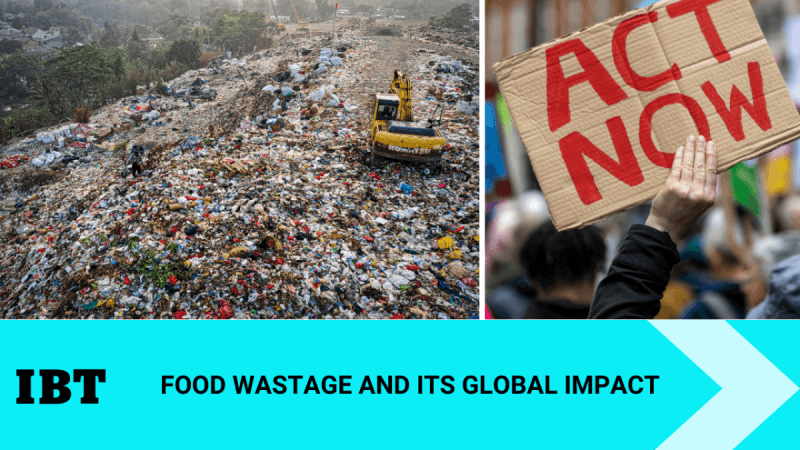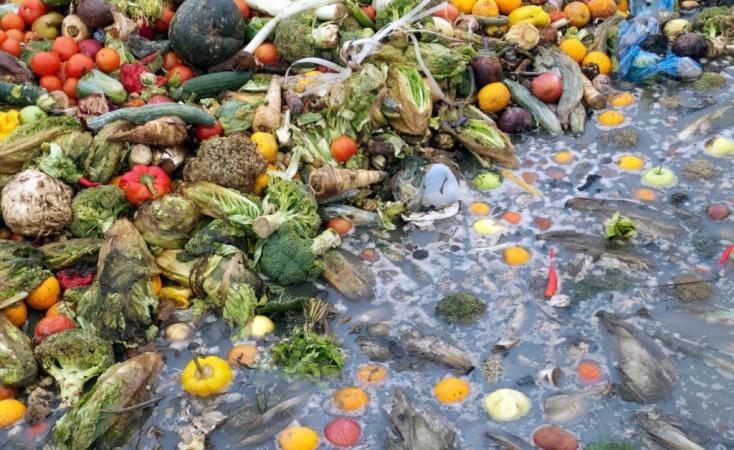Did you know that all the food that you waste and throw away hurts the ecosystem? First, what is food waste?
Food waste occurs when edible food is intentionally discarded by consumers and producers. More than 15% of global food wastage occurs at the farm stage. Farmers abandon their harvests because they may not get a fair price for their produce and find the transportation costs to transport back the produce from the markets to their storage unit too high. Consumers just don't care about food enough and throw it away. This waste that is going to end up in a landfill either gets burnt or rot, both of which produce greenhouse gases that break down the ozone layer and add on to global warming. So, what are the consequences?

Wasted food ends up in close by landfills. Animals eat rotten food from landfill and get sick. Food waste attracts scavengers and rodents. These scavengers attract large apex predators that hunt on them. These apex predators then wander around areas inhabited by humans, putting citizens in danger. An example is where food waste attracts creatures such as mice. Jackals, who prey on these creatures will be active around the landfill. Jackals further put the cities and villages in danger. We attempt to eliminate these animals, disturbing the ecosystem. Food rotting in landfills also emits harmful gases adding nearly 50% of the emissions produced. A large amount of methane is produced while the discarded fruits and vegetables rot in landfills. Note that Methane is a gas deadlier than carbon dioxide. About 17% of global food production gets wasted; 11% of that is in households. Further, 52% of consumers in the US throw away food due to short residual shelf life. Nigeria, Greece and Iraq have the highest annual per capita household food waste in kilograms.
We observe a paradox here. While there are millions of people out there dying every single day just because they do not have enough food to eat, we also notice people are wasting food due to surplus. In Malaysia, 4,005 tonnes of edible food is thrown away every day, which can feed about 2.9 million people three meals a day. We could save lives by not wasting food. Wasted and spoiled food is reusable. Who says it isn't? We can create biogas using food wastage. Biogas burns cleaner than other fossil fuels which means it emits less pollution. It also costs less because of the production methods. A company in India called Shri Balaji Trading company creates biogas and creates electricity using that biogas which will power streetlights and a kitchen that cooks food for at least 900 people for free. You can create compost and fertilizers using food waste, which will later help farmers grow more organic products. Food waste can also be upcycled to produce pet food for farm animals.

What can we as a community act to manage food wastage? Well, do not buy excess food. Any excess fruits and vegetables that cannot be eaten in time thus will spoil due to limited shelf life. Only buy what you need. This will also save money. Do not care about how the food appears. Nature is not perfect. Few potatoes grow misshaped and people throw them away because they don't look good. Thousands of fruits and vegetables are wasted due to similar reasons. The shape of the food doesn't matter, the taste does. This doesn't mean you should buy spoiled food. Misshaped foods do not imply spoiled foods.
What are the different strategies that others have developed to counter food wastage?
Several mobile applications are developed to allow supermarkets and restaurants to list their surplus items at a reduced price (for example, Too Good To Go is a social impact app developed in Denmark). With reduced prices, demand for groceries increases thereby minimizing wastage. How innovative is this? Private operators are also developing several cold storages that can increase the shelf life of the items. Many countries are underdeveloped and do not have the means to preserve food. Cold storages help extend the shelf life so that people can use it for a longer time. Restaurants have started billing customers for the food that they waste. For example, for every 100 grams of food wasted, the customer will have to pay an extra one to two dollars. This makes customers only order the items they wish to eat. Restaurants have also bought a compost container where all the wasted food can be turned into compost, which can be donated or sold to farmers. Food wastage was never considered an important issue, unfortunately, but now it has risen to a level where we cannot turn a blind eye to it. Donate your food to people who don't have the luxuries you can afford.
[Disclaimer: Prisha Roy studies in 8thgrade at Ahmedabad International School, Gujarat, India. She studies global problems that are disrupting the animal ecosystem. The views in this article are of the author.]

















